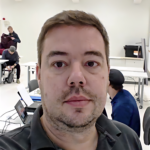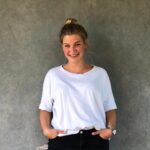Researchers
Jochen Meyer
Dr. Jochen Meyer is Director of the “Society” division at OFFIS – Institute for Information Technology in Oldenburg. The division is working on regional, national, and international projects to develop new technologies for an inclusive and democratic society. His personal areas of research include technologies for lifelong health and prevention, ambient assisted living, and the personal use of multimedia data.
- Tel: +49 441 9722-185
- Location: E126
Daniel Lange
Daniel is a Ph.D. researcher in the field of accessibility for virtual and augmented reality in the Mixed Reality Group at OFFIS. He holds a master’s degree in computer science from the Carl von Ossietzky University of Oldenburg.
He focuses on using virtual and augmented reality technologies to assist people with visual impairments in their daily lives and how to ensure accessibility in shared virtual environments such as the “Metaverse.”
He is currently part of the ABILITY project, which aims to propose a novel multisensory tablet covering the wide range of visual disabilities and needs of the visually impaired population, including collaboration with the sighted.
Eric Landwehr
Eric Landwehr is a research associate and works in the Digitopias project. He holds a master’s degree in computer science from the Carl von Ossietzky University Oldenburg. He investigates the effects of different technologies and concepts on the social interaction of users in virtual and augmented reality. For this purpose, he develops, among other things, multi-user scenarios and avatars to represent users in mixed reality.
- Location: OFFIS E121
Fynn Horstmannshoff
Fynn Horstmannshoff is a researcher in the Social Computing (SOC) group at OFFIS Division Society and responsible for transfer management in the Project Digitopias (Digital Technologies for Participation and Interaction in Society). His work focuses on building bridges into society to transfer scientific knowledge into society and enable dialog and participation of stakeholders and citizens in research at the division. He holds a Masters Degree in International Relations from University of Bremen and Constructor University Bremen.
Heiko Müller
Dr.-Ing. Heiko Müller is a research associate in the Media Informatics and Multimedia Systems group at Carl von Ossietzky University Oldenburg. After completing his PhD on “Ambient Light Displays for Temporal Information”, he spent 18 months doing research at the University of Lapland in Rovaniemi, Finland, as part of the EU-funded DecoChrom project.
As part of his work at the University of Oldenburg, he coordinates the DFG priority program 2199 “Scalable Interaction Paradigms for Pervasive Computing Environments”.
Heiko Müller has contributed to over 40 international publications. He has held various chairing positions at international conferences. He is a member of the GI and the ACM.
- Location: OFFIS E108
Jonah-Noël Kaiser
Jonah is a research associate at OFFIS working on the project SPIELEND. Within its goal of creating a sense of closeness with playful interactions while being physically apart, he focuses on raising social presence through the use of mixed reality. Therefore, he researches and develops novel visualization in augmented reality as well as multimodal feedback to increase emotional immersion and connectedness.
He holds a Master’s degree in Engineering of Socio-Technical Systems from the Carl von Ossietzky University Oldenburg with his interest being human-centered design for augmented reality.
- Tel: +49 441 9722 287
- Location: OFFIS E128
Jonathan Kutter
Jonathan Kutter is a research associate in the Mixed Reality (MXR) group at OFFIS working on the project STARK. His research focuses on how to leverage mixed reality in digital mental health interventions for children. He holds a Master’s degree in Engineering of Socio-Technical Systems from the University of Oldenburg with his focus area being human-computer interaction.
- Tel: +49 441 9722-258
- Location: OFFIS E121
Juliusz Wojtyga
Juliusz is a laboratory engineer in the OFFIS Division Society. He works on the Digitopias project and is a member of the Social Computing Group (SOC). He is currently responsible for the design, construction and maintenance of the Creators Lounge / Fabrication Laboratories. He holds a B.Sc. in Electronics and Telecommunications from the Lodz University of Technology. An avid maker, he has a strong interest in personal fabrication methods and electronics.
Larbi Abdenebaoui
Dr.-Ing Larbi Abdenebaoui is a researcher and leads the “Human Centered AI” group at OFFIS. With a background in robotics and swarm computing, his current research focus is at the intersection of HCI and AI. He is commited to making AI more human-centered, focusing on the area of explainable AI in various applicaiton domains. He advocates for more awareness of the reproduction and enforcement of sociological biases and stereotypes in the design of artifacts, especially those based on AI.
- Tel: +49 (0) 441 – 97 22 730
- Location: OFFIS E122
Maria Wolters
Dr. phil. Maria Wolters is the acting Research Group leader for the group SOC (digital participation) at OFFIS and Reader (associate professor / W2 professor) in Design Informatics at the University of Edinburgh. Her background is in computational linguistics and speech science (PhD, 2000, University of Bonn), she works on human-computer interaction, assistive technology, and eHealth, and she maintains a long-term interest in statistics and mixed methods research. She has published over 90 peer reviewed papers in Human-Computer Interaction, eHealth, and Computational Linguistics.
Maria is passionate about digital inclusion. Around 10% of the population will be excluded from online-only services due to lack of access to technology, a badly designed user experience, lack of interest, or lack of trust. This results in systemic gaps and biases in data-driven systems to support health and social care. Maria is looking at ways to mitigate this by designing solutions that span digital and physical, online and in person.
Mazen Salous
Dr. -Ing. Mazen Salous has started his current job since 01.02.2023 as a postdoctoral researcher in the European project “ABILITY” at OFFIS Institute for Information Technology, Oldenburg, Germany.
In this European project, Mazen is investigating AI-based multimodal solutions to interactively support blind and low vision users while surfing websites and digital media.
Background: Mazen got his PhD title (Dr. -Ing.) from the University of Bremen, Germany, in June 2021. His PhD topic is: AI-based user modeling for adaptation of cognitive systems.
After his PhD, he continued working at the University of Bremen until 31.01.2023 as a postdoctoral researcher within a project for developing a smart helmet, so-called “SmartHelm”.
Previously, Mazen got his master degree in computer science from Ilmenau University of Technology (TU-Ilmenau), Germany, in 2014, and his bachelor degree in information technology engineering from the UOK University, Syria, in 2009.
- Location: OFFIS E108
Mikołaj P. Woźniak
Mikołaj P. Woźniak is a PhD student at the Media Informatics and Multimedia Systems group at University of Oldenburg. He holds a M.Sc. in Electronic and Telecommunication Engineering from Lodz University of Technology (Poland). His research interests are focused on exploring everyday encounters with smart home technology, engineering interactive systems for sensory augmentation and exploring multimodal feedback technologies. Mikołaj’s work has a strong experimental focus, applying multidisciplinary methods to create engaging experiences for various contexts. He also enjoys introducing people to design thinking and convincing engineers design is important.- Tel: +49 (0) 441 – 97 22 178
- Location: OFFIS E108
Nadine Wagener
Dr.-Ing. Nadine Wagener is the acting Research Group Leader of the Personal Pervasive Computing (PPC) group at the OFFIS Institute for Information Technology in Oldenburg, Germany. She holds a PhD in Computer Science from the University of Bremen, and completed her postdoc at the Max-Planck Institute for Informatics in Saarbrücken, including a research stay at Cornell Tech in New York, USA. Her academic background is in Human-Computer Interaction (HCI).
Her research focuses on designing everyday technologies that foster well-being and support users in their daily lives. Spanning VR/AR, wearables, smartphones, smart homes, robotics, and AI, her work promotes individual and societal health and participation by encouraging reflection and personal growth through technology.
Nadine Wagener actively contributes to the HCI research community as an author and reviewer for leading conferences and journals, such as ACM CHI, DIS, and IEEE VR. She also serves in chairing roles and contributes to the organization of these conferences.
- Location: OFFIS E110
Pavel Karpashevich
Pavel is a postdoctoral researcher at Carl von Ossietzky University of Oldenburg and holds a PhD in Mediated Communication with a specialization in Human-Computer Interaction from KTH Royal Institute of Technology. His research focuses on novel tangible on-body interfaces, aiming to develop new technologies, smart materials, as well as meaningful interactions and experiences for them. Pavel is participating in the interdisciplinary SKIRIM project, which aims to explore the potential of shape-changing interfaces in smart home environments.
Saja Aljuneidi
Saja Aljuneidi is a senior researcher in the Human-Centered AI (HAI) group at OFFIS – Institute for Information Technology. Her researches focuses on the use of Artificial Intelligence (AI) in Public Administration. She aims to make administrative services fairer, more transparent and more accessible for all. She worked on many projects that connects research and industry including ISSS.KOM, BUKI, and Digitopias. Aljuneidi is a doctoral candidate who holds a master’s degree in the field of Human Computer Interaction from Siegen University in Germany, and a bachelor’s degree in Computer Science from Birzeit University in Palestine.
- Location: E118
Simon Kimmel
Simon is a Senior Researcher at OFFIS, focusing on novel interaction possibilities and application areas of mixed reality. He holds a Master’s degree in Engineering of Socio-Technical Systems from the Carl von Ossietzky University Oldenburg.
Currently, he is part of the Pflegeinnovationszentrum (PIZ), where he investigates how Augmented and Virtual Reality can foster social presence and connectedness in telecare scenarios — for example, by supporting meaningful interaction between care workers and patients during robotic or remote care activities. Previously, he contributed to the ZEIT project, exploring the use of virtual reality as a communication tool to strengthen emotional bonds between nursing home residents and their relatives.
Across his work, Simon’s research centers on enhancing social presence and empathy through immersive technologies, with the overarching goal of creating solutions that enable more meaningful and intimate social bonds across distance.
- Tel: +49 (0) 441 9722 731
- Location: E121
Sophie Grimme
Sophie Grimme is a researcher in the Personal Pervasive Computing (PPC) group at OFFIS. She has a Master’s degree in Human-Computer Interaction and is currently working on the NEST project (New Technologies for Emotional and Social Support with Postpartum Depression), which aims to develop digital technologies to support women during the postpartum period. Her doctoral research investigates how digital technologies can empower women to maintain agency and control over their intimate health data, emphasising transparency and trust in design.
- Location: E104
Susanne Boll
Susanne Boll is a Professor of Media Informatics and Multimedia Systems in the Department of Computing Science at the University of Oldenburg, in Germany. She is also a member of the executive board of the OFFIS–Institute for Information Technology in Oldenburg, an associated research institute of the University of Oldenburg. Her research interests lie in the field of multimedia and intelligent user interfaces. She teaches Interactive Systems and Interactive Multimedia in the Bachelor Programme in Computer Science and offers lectures and practical lab courses in HCI, Wearable Computing and Digital Fabrication in the Master Programme in Computer Science. Since recently Susanne Boll is also a co-founder of the new Master Programme in Computer Science „Engineering Socio-Technical Systems“. She is leading several national and international scientific projects with strong cooperation with research experts world wide. She head one of the few leading groups in Europe that works on mobile and ambient user interfaces exploring different novel modalities such as visual, auditory and tactile in pervasive displays.
- Tel: +49 (0) 441 – 97 22 213
- Location: OFFIS
- Website: Link
Tobias Lunte
Tobias is a PhD student and research assistant at the University of Oldenburg, department for Media Informatics and Multimedia Systems. Here he received his M.Sc. in Engineering of Socio-Technical Systems in 2020. His research focus is on Gaze Tracking and Assistive Technologies. In particular, he investigates gaze-aware methods to support children in reading and reading acquisition. Furthermore, Tobias is active in teaching in the field of interactive systems. He teaches aspects of HCI, Scientific Practice and Mixed Reality and helped develop a concept for the distributed implementation of a hardware-related HCI lab, the Maker’s Lab.
Wilko Heuten
Since 2001 Wilko Heuten is a scientific researcher in computer science at OFFIS – Institute for Information Technology in Germany. His particular research interest is the design and development of multimodal, pervasive and peripheral non-screen interfaces to support persons in various situations. Overall, he has published with his co-authors more than 90 peer-reviewed publications on national and international conferences and journals. Wilko Heuten is active in reviewing articles and papers for top-rated HCI conferences and journals and is teaching HCI related lectures at University of Oldenburg.
- Tel: +49 (0) 441 – 97 22 171
- Location: OFFIS E 125




















